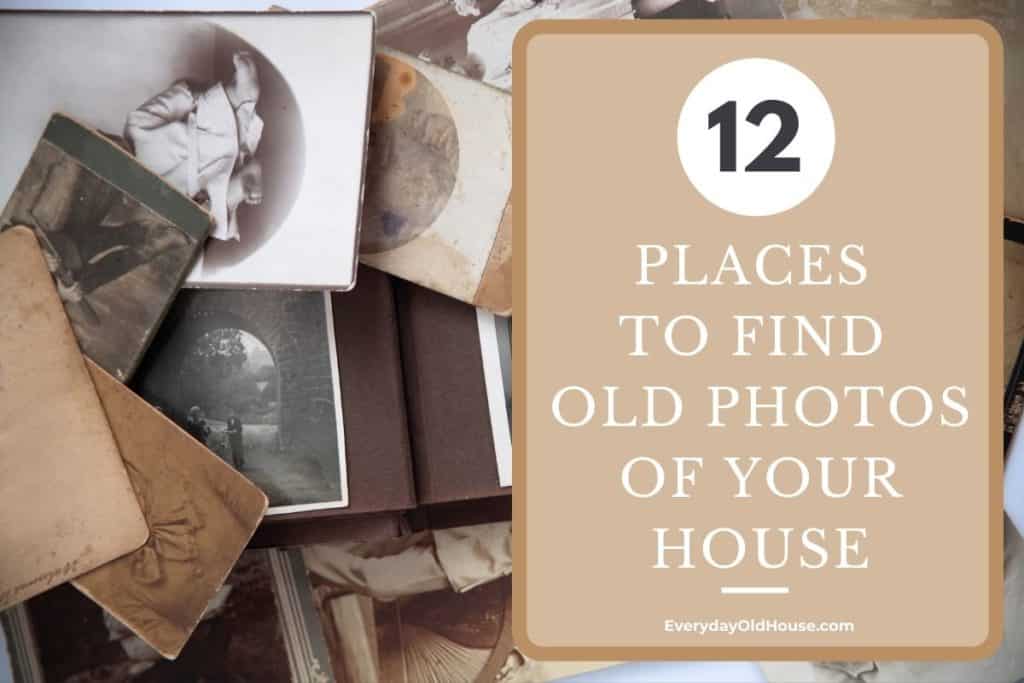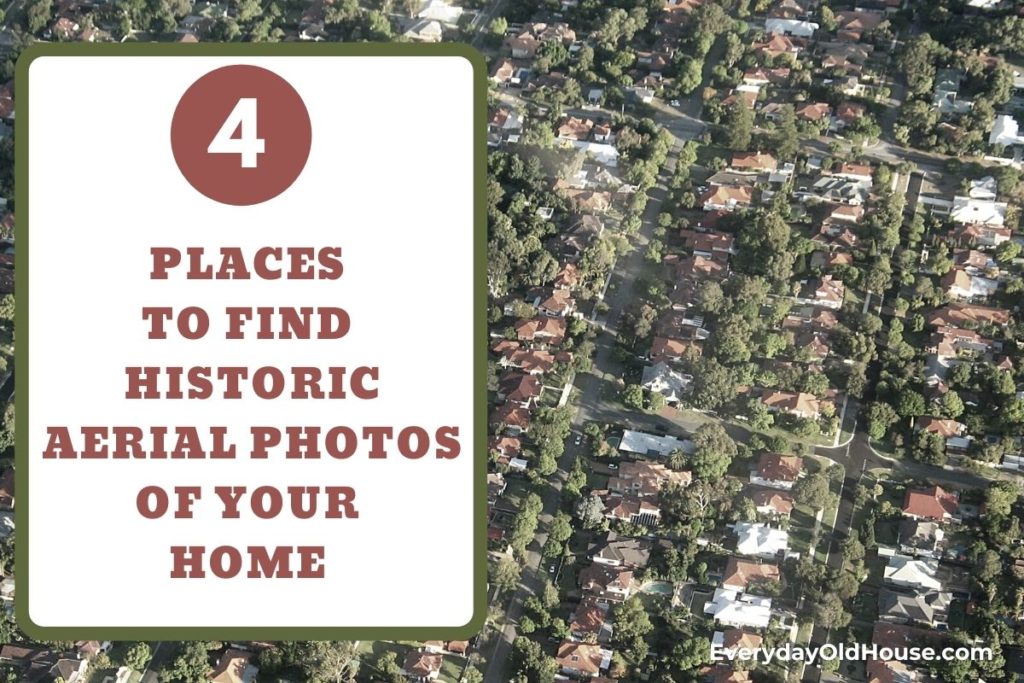Are you in the market for a new home and trying to avoid buying a house reminiscent of the Amityville Horror Show? Already own your home but keep feeling an indescribable presence? Or perhaps you’re just plain curious about the history of the people who lived (and possibly died) in your house. Whatever your motivation, here’s 11 simple ways to determine if anyone previously died in your house.
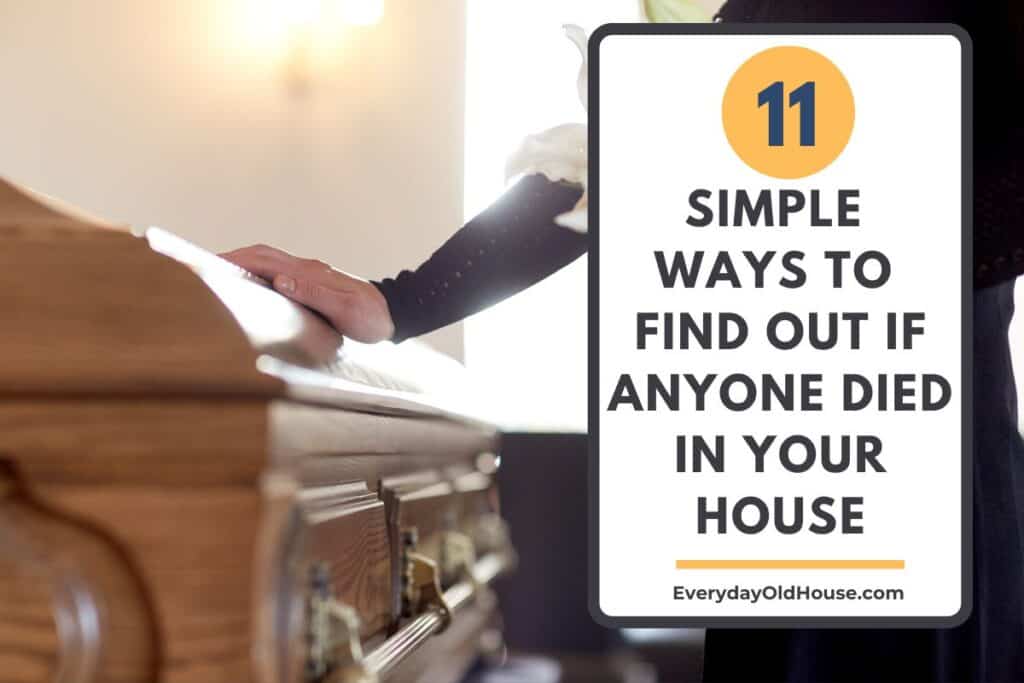
This post contains affiliate links, including but not limited to, Amazon Associates. As such, I earn from qualifying purchases. Full disclosure located here.
What are the Chances of Someone Dying in a House?
Obviously, the older the house, the higher the chance that someone has died there. In earlier times especially before the construction of nursing homes and large hospitals, it was common for deaths (as well as births) to occur at home.
Bottom line – if you own an older home, someone probably died there.
But don’t panic. Maybe those deaths were elderly ones slipping away peacefully after a full, happy life, surrounding by their loved ones. Isn’t that the way you might want to go?
But your home doesn’t have to be 150 years old for someone to have died in it.
Even if you have an newer home, there is still a decent chance of a potential death in your home. Statistics show that even in today’s modern society, between 20-30% of U.S. residents still die at home. (honestly, that’s more than I expected).
Think of a death in your house as one of the many events (births, weddings, etc…) that shape your home’s robust history.
Does a Death Affect a Home’s Value?
If you’re buying or selling a home, you might be curious if a death would impact its property value. The good news is that unless there was gruesome murder, a natural death in the house does not significantly impact property values.
According to sources, natural deaths have no impact on property value. However, violent death from murders and suicides can decrease property’s value by 10% – 25%.
Note…..
Remember that even if you don’t find any records of anyone passing away in your home, it isn’t a guarantee it hasn’t happened. Old records and databases are not always reliable nor accurate. Records – especially paper ones – get lost or thrown away, or even destroyed by fire or flood.
11 Ways to Determine if Anyone Previously Died in Your House
Whether you’re selling your house, buying a house, or just a curious homeowner, it’s common to wonder if someone died on a property. Luckily, there are several amazing resources (many free!) to find out.
Personally, I haven’t researched if anybody died in my house. Honestly, I’m not sure how I would react. Realistically the chances are good that someone died in my house since my house is over 100 years old. But I’m too chicken to research.
But if you are braver than me, here’s 11 simple ways to determine if anyone previously died in your house.
Good luck in your search!
1. Google It
While this method isn’t the most fool-proof way to find out if anybody died in your house, it certainly is the fastest. If a death happened as the result of a newsworthy event, it should pop up in on page 1 of Google, Bing, Yahoo’s power search engine results.
If you happen to live on a main or common road, you may want to limit your search by adding words to the end of the address with words like “crime”, “fire”, “death”, or “obituary”. Note that many newspapers won’t divulge certain details (like suicides) out of respect and privacy of families.
Hopefully if you search for your address and “death”, any results that pop up will be positive. For example, the death of a famous local personality – a revered politician, school teacher or religious leader – who did great things in your town.
2. Interview Neighbors
Neighbors are the ears and eyes of your neighborhood. They know the good things and bad things happening on your street. And if you find the right person, he or she can be a gold mine of information.
Your best method is to seek out those neighbors who have lived on your block for an extended period time. Engage and listen to their stories. If you have a list of your home’s previous owners, mention these names to the neighbors and see where the stories take you.
A downside of relying on a neighbors to determine who died in your house is that you are relying on someone else’s memories. So information, like cause of death, may not be completely accurate.
Don’t Own the House Yet?
If you don’t already own the house and merely shopping, it might be an awkward introduction to the neighborhood. But if you’re concerned and motivated enough, this might be a great method.
3. Visit Local Library
Public libraries are a great resource for finding old documents. Don’t try to do this yourself. Seek out the local reference librarians and ask for help and save time and frustration. Chances are he/she will points you towards the local newspaper archives.
Newspapers contain decades (even a few centuries) of obituaries and crime reports that could tell you if anyone previously died in your house. It’s probably the most robust resource for finding out if anyone died in your house, BUT depending on how the newspapers are archived, it can be a large time suck.
Hopefully, your local library has all its old newspapers digitized and ready for search via computer. If this is the care, then you are in prime condition to search fairly quickly.
However, technology may not have caught up at your local library. Newspaper archives may not be digitized and indexed with a powerful online search option. You might find yourself in front of a microfiche/microfilm machine.
I remember these machines from the past, and they can be tricky to navigate. But with a little patience and time (and tips from the librarian), you should be able to complete your search.

4. Email Historical Society
Local libraries are the only treasure-trove of historical information on a town or city. Historical societies also tend to keep archives of local newspapers (if you library doesn’t have them).
From personal experience, I highly recommend reaching out to the local historical society. When researching the history of my house, I sent an email to the historical society. And their response was amazing – it gave me a well-painted picture of who lived in my home and the history of my neighborhood.
BEGINNER’S GUIDE TO HOME HISTORY RESEARCH
Interested in researching the history of your old house but unsure where to start? Grab my newly-release:
Beginner’s Guide: How to Trace the History of Your Old House
This 60-page guide takes you step-by-step through 25+ online and in-person resources to create a picture of your home’s history.
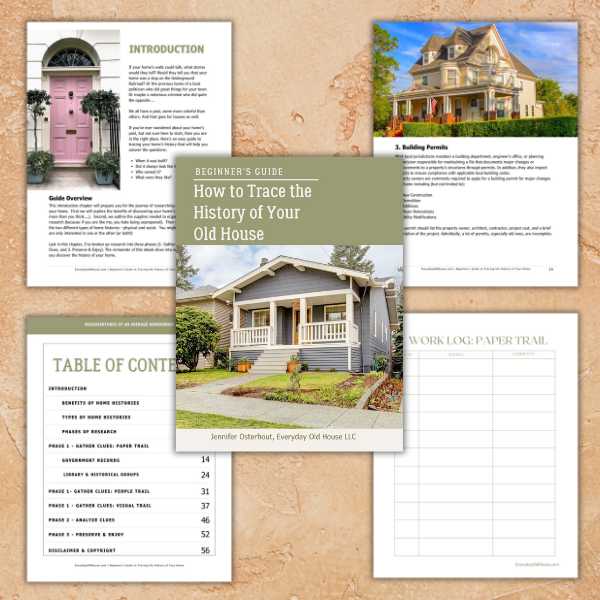
BEGINNER’S GUIDE TO HOME HISTORY RESEARCH
Interested in researching the history of your old house but unsure where to start? Grab my newly-release:
Beginner’s Guide: How to Trace the History of Your Old House
This 60-page guide takes you step-by-step through 25+ online and in-person resources to create a picture of your home’s history.

5. Call the Vital Records Office
In addition to the library and historical society, another local agency that might be useful is the vital records office. Reach out to your local municipality and inquire where you can view public listings of death record and certificates (online or in-person).
In the United States, the death certificate should list the deceased’s place of death, whether it’s at their home, hospital, or nursing home.
Unfortunately, while death certificates usually list a place of death, some vital record databases might be searchable only by person’s name and not by address. So be sure to first ask if the database is searchable by address.
6. Pay DiedInHouse.com
DiedInHouse.com is the first of its kind, web-based service that helps you discover if anyone previously died in your house. It’s the easiest way to find out who died in your house. But it’s not free. However, the cost is reasonable (around $12). That’s a small price for pay to let someone else do the leg work.
This service pulls data from over 130 million police records, death certificates and news reports, which seems substantial. It will provide you detailed information on deaths occurred in your home, such as:
- Deathat the Address and any Details
- Names of Associated People
- Cause of Death (if available)
In addition, DiedInHouse.com also provides records of other uh, more, uh, unpleasant activities reported as occurred in or near your home…
- Meth Activity
- Fire Incidents
- Registered Sex Offenders
Note that the depth of this database for many locations goes back to only the mid-1980s since it relies mainly on digitized death records. So previous events that happened at your home many not come up in the report.
7. Explore HouseCreep.com
Similar to DiedInHouse, HouseCreep.com is a database containing addresses of homes where death records associated with murders, crimes, or other historical events have occurred (even reports of paranormal activity!).
Important information is gathered through people uploading and publishing directly on the website, such as:
- Personal experiences
- Online articles
- Old newspaper clippings
- Death certificates
- Other public records,
It is free, unlike DiedInHouse. However, the database is built using crowdsourcing, so their database is likely not as complete nor accurate.
Personally, I think a good idea would be to check both HouseCreep AND DiedInHouse.com.
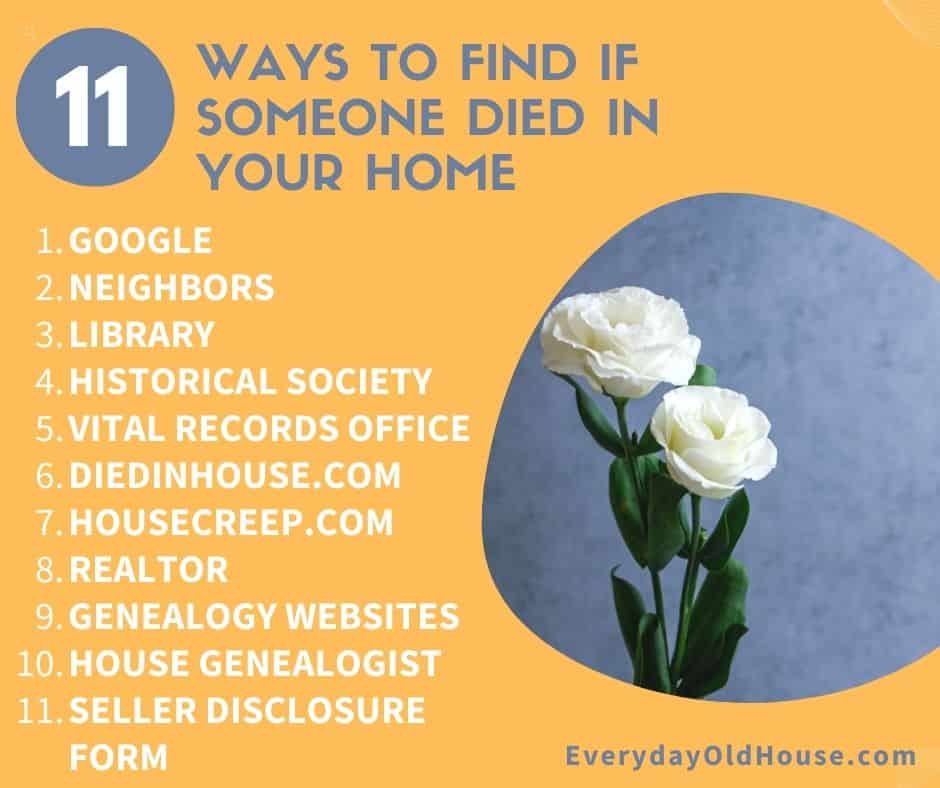
8. Dive into Genealogy Websites
While you may have considered online genealogy websites to learn about your ancestors, these websites also can be a resource to learn about the past owners of your house.
There are a plethora of online genealogy websites out there, with these being considered the most comprehensive and beginner-friendly:
Personally, I love going down a rabbit-hole with these websites. But they have their challenges.
I find these online databases time-consuming and difficult to navigate (hence not as simple as the other ways mentioned here). Plus, searching by a street address isn’t available for many of these databases. So I recommend trying this method after utilizing some of the other methods.
Many of these websites are free to search, but some do charge. Since many libraries provide patrons free access these online genealogy websites (like mine), check with them before purchasing a membership.
9. Hire a House Genealogist
If you want a thorough search to determine is anyone previously died in your house, your best option might be to hire an expert. A qualified, house historian (or genealogist) knows exactly where to dive deep into various historical records and tease out tidbits to find out if anybody died in your home.
This way is probably the most expensive way to uncover your home’s history, but leaving it to the professionals gives you the best odds of finding complete and accurate information. And leaves you free time to do something else.
Not sure where to find one? Search this database on where to find a house historian.
10. Ask a Real Estate Agent
If you are in the market to buy a house, you may find out if anybody died in your house simply by asking your real estate agent.
A realtor’s job should encompass any due diligence needed to get their customer’s comfortable with making a sound decision on buying a house. And personally, understanding the history of a house – including any notable crimes and deaths – should be one of them.
11. Review Seller Disclosure Form
Another option to find out if anybody died in a house you are considering buying is reviewing the seller disclosure form.
Real estate disclosure laws vary from state to state. Unfortunately, most states don’t require sellers to disclose a death in a home, no matter how it occurred. It’s not what is considered a “Material Fact”. A suicide or murder could have occurred last month and the seller is not legally required to disclose.
There are a handful of states that DO legally require sellers to disclose the history of a home, including knowledge of a death, murder, suicide or even hauntings at the property. These states – California, Alaska and South Dakota – have the strictest death disclosure requirements for house sellers.
- California: Sellers must disclose all deaths, even natural, within a house within the last 3 years.
- Alaska: Sellers must disclose any known murders or suicides
- South Dakota: Sellers must disclose any known homicides, murders or felonies within the last 12 months.
But if you don’t live in those states that consider deaths a Material Fact that needs to be disclosed, then you can be left in the dark.
Still Can’t Find Info?
If you still can’t find out if anyone previously died in your house, you might need to dive a bit deeper. Another way to determine if anybody died in your house, instead of searching by address, is to search by occupant name.
Unfortunately, this entails a bit more work. This requires you to research and create a list of people who either owned or rented your home through a variety of resources. Then, using this list of names, you can return to the listed above (i.e. newspaper archives, historical society, genealogy websites, etc…) and search by names to find obituaries that may tell you their place of death.
To learn more, check out this post on Who Slept in My Bed? 7 Ways to Find Out Who Lived in My House.
Related Posts
Want to be the first to know about new posts? Be sure to follow me on Pinterest, Facebook, Instagram or Twitter of even Etsy! Or better yet… Subscribe below!
My monthly (admittedly sometimes more, sometimes less….) emails are like receiving a unexpected letter from an old friend WITHOUT needing to put on your slippers and walk out to your mailbox…. See? I got ya, my friend!)
[Note: My posts are proudly connected to these amazing link parties full of DIY ideas and inspiration!]
